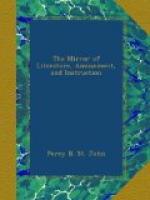“I have confronted and compared it with the sight of that pennie at Rome, and the other in the Temple at Paris, and they are all three alike, both in the visage and in the circumference. Mine is in weight two groates, a halfe pennie less of silver, which commeth to twelve sols and one liard. On the other (one?) side, it hath the visage of the sunne, like to the fashion of a young man’s face, without a beard, with long locks of hayre, as here it is figured, and as poets have feigned. On the other side is a blowne rose, higher and greater than ours are;[13] which commeth somewhat neare in resemblance to the rose which we tearme of Jericho, and which are brought from the Holy Land. Upon this pennie the rose hath, on eache side, a button, (bud) the one whereof beginneth to blome, but not the other. Above the rose, on the ring of the piece, is formed in capitall Greeke letters, [Greek: RODION], (Rhodian,) which signifieth, and would say (if it could) a rose. At the foote whereof is this sillable, EY. (Favine then mentions the arms of Rhodes, which, as well as we are able to translate the old French, left untranslated, appears to be Field d’Argent, a rose proper, with buds; gules, stalk, de synople.) So,” he continues, “that thirtie pence of this money amounteth not but altogether to the summe of eighteen poundes seaven shillings and sixe-pence of our money, and seemeth a very small summe for buying a piece of ground, or land, which the Evangelists call Ackeldemach, (Alcedaema), ‘The Potter’s Field,’ so neere to Jerusalem peopled with more than a million of men, solde for an offence, and with condition that it should never be redeemed, in regard it was destined for the Burial-place of Pilgrims, which came to Jerusalem at the solemn Feasts there held; and every one well knoweth, that (amongst the Jews) inheritances were sold, more or less, according as the conditions were made, either neere, or further off, from the yeare of jubilee, which they feasted from fifty yeares, to fifty yeares; a feast, so solemnly observed among them, that the sellers did then re-enter into their sold inheritances, which they possessed again freely, and without any charge, or paying any arrerages, according as it was ordained by their law, in the five-and-twentieth chapter of Leviticus. But it may be, this Potter’s Field was (in parte) bought with those thirtie pence, and the other parte might be the almes and giftes of the proprietaries or owners, both in the Temple of Jerusalem and publickly, for so good a subject as the buriall of pilgrims, and poore strangers. For ever, and beside the offerings and Tribute-money, which the Jews offered and paid to the treasurers in the Temple, for maintaining the Tribe of Levi, (the deserving ministers thereof) who, at the distribution and division of the Land of Promise to the Jewish people, had not any lot or partage (but were assigned to the Jews devotion,) inheritances might be legacied to them, which falling into mortmaine, could not be redeemed by any custome of kindred, whatsoever jubilee might be alledged, or selling, or alienating, as it is written in the seaven-and-twentieth of Leviticus. And such an inheritance was called Ager Anathematis—a field wholly dedicated and consecrated to God; and which from thenceforward, might fall no more into any secular, or prophane hand.”




